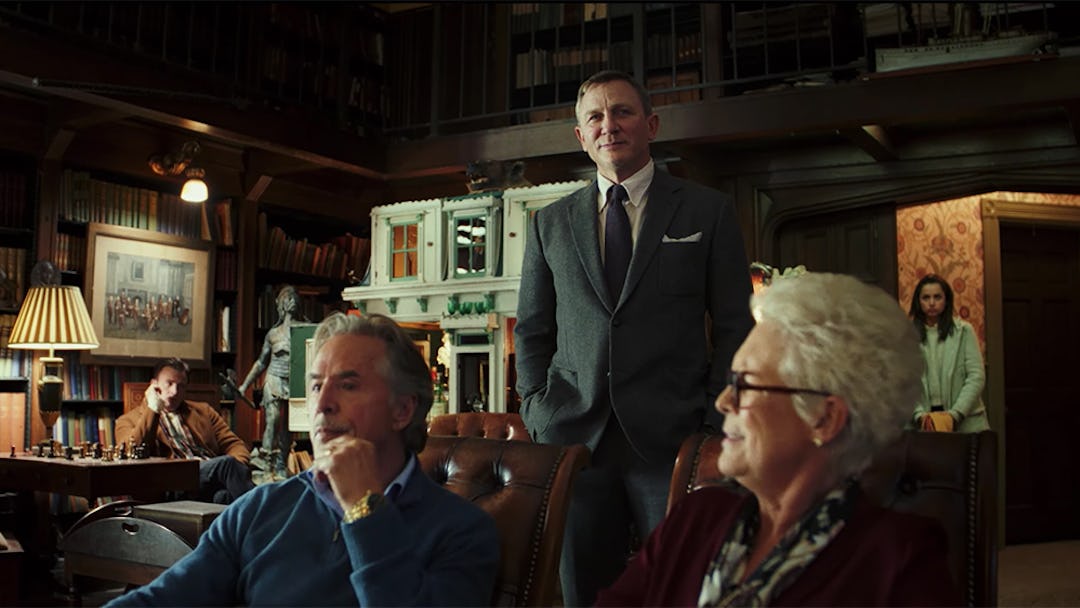Rian Johnson’s Knives Out opens with the image of a giant manor house. Strings surge loudly on the soundtrack; hounds run from the estate in slow-motion. This, folks, is how you open your movie – with big, broad, theatrical gestures, acknowledging the traditions you’re working within, and will, if you’re clever, subvert. It’s a note so deliciously right that we settle in; we’re in good hands here.
Johnson has somehow become a divisive filmmaker, which is peculiar, since all he’s done is make a bunch of terrific entertainments (including easily the best Star Wars movie in thirty-plus years), but fine. His latest feels less like a follow-up than a reaction, an opportunity to flex different muscles; it’s much closer to his 2008 feature The Brothers Bloom, a joyous, wind-up toy of movie that has gone, alas, sadly underseen.
That picture immerses itself in the language and conventions of the con-man movie, though it takes pride in gleefully coloring outside those lines. Knives Out does something similar, staking a claim in the visual and narrative tropes of the Agatha Christie-style whodunit; they’re the kind of books its focal character, the deliciously named Harlan Thrombey, has made his fortune writing (over 80 million copies sold, we’re told.) Those words have paid for his mansion – “The guy practically lives in a Clue board,” notes Lakeith Stanfield’s police detective – and have bankrolled the activities of his three children, and their children. But on his 85th birthday, he’s decided to cut them all off, so when he turns up dead the morning after his big birthday party, just about anyone could be responsible.
None of this is revealed in the ways you’d expect. His throat is cut, and his death is presumed a suicide; only a week later is the family reunited for follow-up interviews, this time with Benoit Blanc (Daniel Craig), a “private investigator of great renown,” sitting in. And thus, Johnson’s clever screenplay is toggling between these conversations and the events described, which are invariably shaded by the prejudices and pride of the tellers. And the director nimbly hopscotches between those cross-examinations, because they all contradict each other as well, constructing a series of marvelously intermingled interrogations that play like a 21st century Rashomon remix.
All of this is clockwork, tight as a drum, but that’s just the beginning of the filmmaker’s invention. Around forty minutes in, he casually gives up the entire plot, clueing us in on who did it, and how – and so from then on, we’re waiting for Blanc to catch up with us, rather than the other way around. (It’s the Columbo over Christie approach). And thus big clues and little giveaways are dangled, for the viewer to anxiously await discovery, and even then, it’s not simple; slyly, in turn after turn, he yanks off the tablecloth again.
Delving any deeper into the plot means stepping into spoiler territory, which would be a crime in itself; one of the most thrilling aspects of Knives Out is the precision and deftness with which it doles out information. Suffice it to say that the games Johnson plays with audience sympathy – with which characters we want to get away with something – are ingenious. And the ensemble cast is tip-top; Christopher Plummer is fierce and feisty as the deceased, Toni Collette is uproariously funny as a JV Gwyneth Paltrow, Jamie Lee Curtis’s comic timing has never been sharper, and Chris Evans is clearly having a blast playing, well, the anti-Captain America. But special note must be made of Ana de Armas, who is handed a movie-star role, and fills it; watch closely, the pause Johnson lets her take (in the midst of his Rube Goldberg machine of a movie) to grieve for Plummer, before the movie must progress. Any actor who can take you where she does, in that briefest of moments, can write her own ticket.
Johnson’s script is such a crackler that it’s easy to focus one’s praise there, undervaluing his zippy direction, full of elegant compositions, snazzy camera movements, imaginative needle drops (I never thought I’d describe Gordon Lightfoot’s “Sundown” as “haunted,” but here we are), and, yes, even a car chase – in a Hyundai, no less. But this is going to happen, because that script is such a brain-bender, up to and through a third act that turns all of the conventions and expectations inside out, seeming to tell us everything, and doing nothing of the sort. Mainstream movies have all but forgotten how to work to entertain us, not by the lumbering heft of their effort (in budgets, in effect, in inter-connectedness), but by puzzling out ways to put on a good goddamn show, without talking down to (or over) the audience. Knives Out does that, and well. It’s pure pleasure.
"Knives Out" is in theaters Wednesday.
